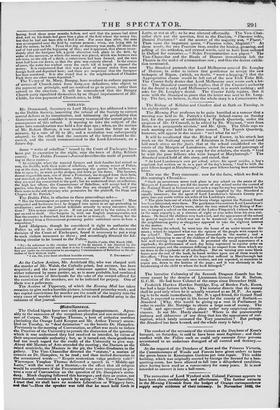Some "writs of rebellion" issued by the Court of Exchequer
have been put in execution in the night, near the town of Athy, Kildare county. The Dublin Freeman's Journal describes the mode of proceed-
ing in these cases-
" At midnight, when the wearied farmers and their families hail retired to rest, the Bailiffs, with their writs of rebellion, and a strong escort of I'olice, rap at the door, and the inhabitants, suspecting the parties to be robbers, re- fuse to open it ; to work go the sledges, and down go the doors. The farmers, decent respectable men, one of them a Protestant, are dragged from their beds, and marched, at that late hour, into Athy, a distance of four or five miles ; they are next day committed to the gaol ; but we understand that, on reflection, the high law officer, the Commissioner of Rebellion, will accept bail if the 'parties, who deny that they owe the tithe they are charged with, will pass their notes to the soft attorney who prosecutes for the plaintiff, the Dean and
• Chapter of St. Patrick."
The Dublin Pilot, in allusion to these proceedings asks- " Has the Government no power to stop this exasperating system ? Must antiquated and barbarous laws be dragged into action in an age pretending to ; and are the judicial tribunals actually to usurp executive func- tions? This system cannot go on. If not put an end to by the rulers, it will .put an end to itself. Our turprise is, with our English contemporaries, not that the country is disturbed, but that it can be so tranquil. Nothing but the hope derived from a Government possessing public confidence saves us from a
convulsion."
Lord Mulgrave, though he considered it right to authorize the Police to aid in the execution of writs of rebellion, after the recent decision 4 the Court of Exchequer, found it necessary to put a stop to such violent measures as these ; and accordingly directed the fol- lowing circular to be issued to the Police.
" Dublin Castle, 19th March 1836.
Sir—In reference to the circular letter of the 2d instant, 1 am directed by the Lord-Lieutenant to acquaint you. that it is his Excellency's order that the Constabu- lary are under no circumstances to accompany Commissioners of Rebellion in the ear cation of their writs at night.
" I am, Sir, your most obedient humble servant, T. DRUMMOND."


























 Previous page
Previous page